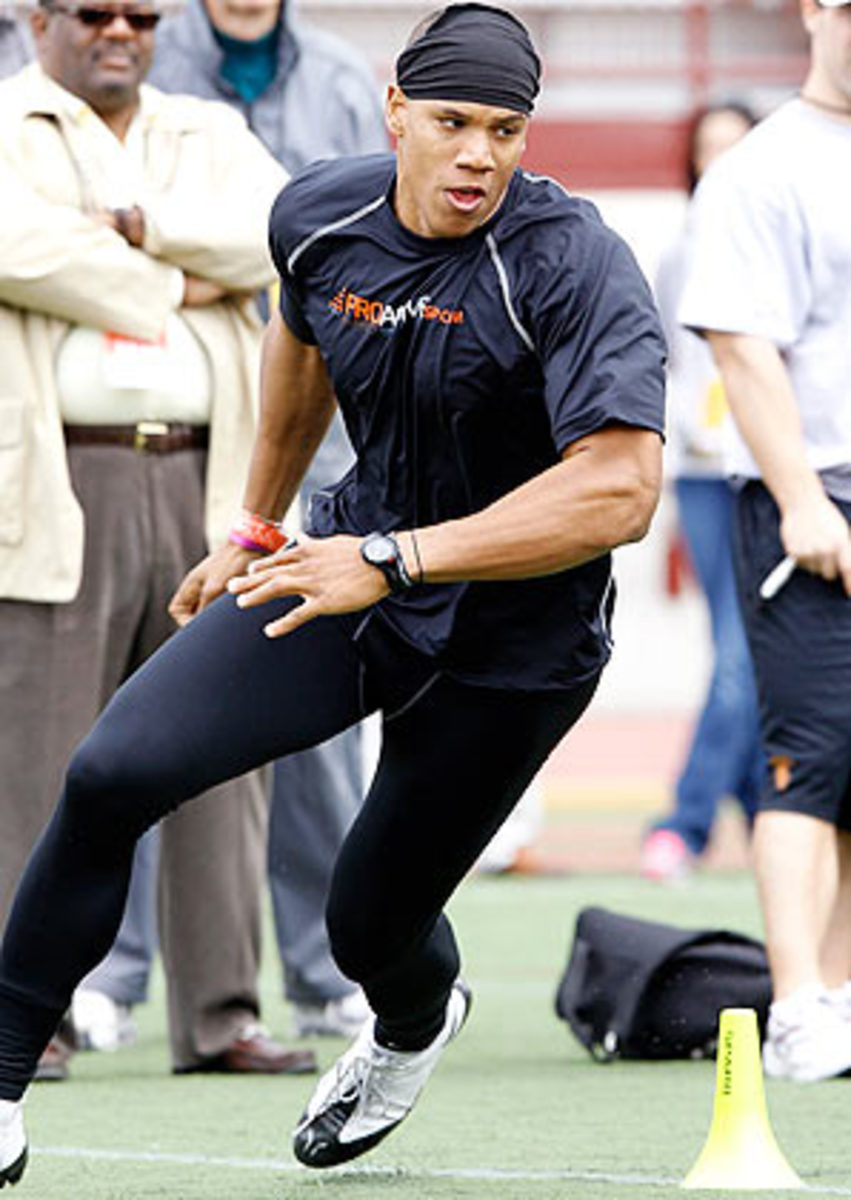
Prospects facing crucial transition
Notre Dame quarterback Jimmy Clausen's workout Friday represented the culmination of the two-month combine and pro day circuit for draft prospects. But now that the over-hyped physical testing period has concluded, players must immediately switch gears and put all of their focus into the position specific drills and conditioning they will ultimately be judged on once they don their first pro helmet.
Most of the players drafted April 22-24 will never again run a 40-yard dash or three-cone drill, though they have run hundreds of each during their training since the end of the college season. It is absolutely critical for these prospects to put the same amount of time and energy into the drill and technique work that they are likely to do during minicamp as they did into their vertical jump and short shuttle. That's because in the NFL, like a lot of things in life, first impressions are huge. They don't mean everything, but they mean an awful lot.
Though that may be especially true in the case of late-round draft picks and undrafted free agents, even first- and second-rounders should be doing whatever it takes to get off to a fast start. That's in part because it is not just the coaches and front office executives on whom they are making an impression. It is their veteran teammates as well.
Coaches are very hesitant to play rookies they, or the veterans, don't fully trust. Naturally that trust is formed over time, but the foundation is established right away. Veterans and coaches will watch the young players very closely to get a feel for their work ethic and football intelligence.
Rookies who get off to a fast start will begin to get more reps and opportunities, which will afford them the chance to sustain that momentum. Conversely, first-year players who start slow can eventually overcome that but it will take time.
No matter where a prospect is drafted or how much the scouting department likes him in college, he is still a complete unknown at the professional level. As such, franchises get very anxious to find out exactly what that player is really capable of in the NFL. They want to attach a label to each player as soon as possible so they know what they have. Those labels begin to get formed at these initial minicamps because by the time rookies get on an NFL practice field nobody really cares about what numbers they posted in March and April. All they care about is how that player can potentially help them on the field on Sundays in the fall.
To the mailbag ...
If the Redskins wanted to make sure that Albert Haynesworth worked out with his team during the so-called offseason, then why didn't they build language like that into the ridiculous contract they gave him? Seems like their own stupid fault, doesn't it?--Matt Burk, Pittsburgh, PA
I totally agree. Obviously, it wasn't enough of a priority that the 'Skins felt compelled to put it into his contract like a lot of teams do. Not to mention the fact that sending Haynesworth a check for $21 million on April 1 is essentially a "do whatever the heck you want to do" hall pass.
Good article on "Lying, coaching go hand-in -hand in NFL." Life in the NFL is really not that much different from that of any other large, competitive business organization. Coaches and GMs are the faces and decison-makers for their organizations, and just like corporate CEOs and politicians they must protect the interests of themselves and their investors. Think of the pre-draft period as similar to the "quiet period" before a public company releases its earnings. CEOs , CFOs and other officers are not allowed to comment on inside information they may have because it could be used by their competitors and damage their business. Very few CEO's let the world know when their company is about to post a big loss ahead of time. The NFL is simply functioning just like any other big-business.--Gino Riccardini, Tinley Park, IL
You're exactly right, Gino. I was actually talking with some of my college teammates who are lawyers and investment bankers about this subject and they echoed your sentiments almost exactly. I guess I just really find it interesting that it is such a socially accepted practice in a world in which seemingly every other little transgression gets magnified and scrutinized to no end.
Hi Ross, regarding your article on the Steelers, I'd just like to say that the reputation of the TEAM is more important than ANY player(s). Would we miss Ben Roethlisberger -- you bet! Santonio Holmes less but still -- yes. However, that doesn't change the fact I would still rather see them leave than continue to tarnish the reputation of MY Steelers. They are both on strike two -- I'm not sure we can afford to take a chance on strike 3. I say let them play one more season and then trade them both away.--Bill Gardner, Des Moines, Iowa
You are certainly not the only one who feels that way and is sick of these two having their names in the paper for the wrong reason. But in the interest of fairness, neither man has even been charged, let alone convicted regarding these allegations. That said, I wonder how many Steelers fans sincerely want to get rid of these two players, especially if it leads to some losses piling up.





